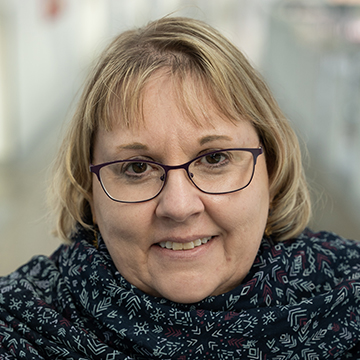Professional Summary
Prior to attending Purdue for my Ph.D., I studied computer science and worked at IBM for 12 years as a programmer and project manager. This inspired me to specialize in media studies and new media. My primary research interests are technology adoption and adaptation including media law, and the uses and effects of technology on communication processes (particularly in the classroom). My current research projects include the use of cell phones in the classroom, and the intersection of social media and the First Amendment. I particularly enjoy teaching and am passionate about media literacy education and making students good digital citizens.
Education
- Ph.D. in Communication, Media Technology and Society, from Purdue University. Minors in Organizational Communication and Research Methods
- M.S. in Computer and Information Science from University of Minnesota
- B.S. in Computer Science and Scientific and Technical Communication from Michigan Technological University
Professional Activities
- Adjunct, University of Dallas
- Assistant Professor, University of Wisconsin – La Crosse
- Visiting Professor, Purdue University
- Adjunct, University of St. Thomas
- Programmer, team lead, consultant and project manager, IBM
Courses Taught
- Public Speaking
- Business and Professional Communication
- Mass Media and Contemporary Society
- Human Communication and the Internet
- Introduction to Research Methods
- Advanced Topics in Small Group Communication
Administrative & Service Responsibilities
- IU Columbus Assessment Coordinator
- IUPUI Program Review and Assessment Committee
- IUPUI General Education Review Subcommittee of the Undergraduate Affairs Committee
- IU Media Literacy Week Co-Chair
- Communication Law Review, Editor (January 2022 - Present)
- Digital Gardener Faculty Fellow
- Editorial Board, Journal of Media Literacy Education and Communication and Democracy
- National Communication Association, member and former officer. Divisions: Communication and Law; Freedom of Expression.
- Member National Association for Media Literacy Education
- Anti-demand Working Group and Youth Curriculum committees of the Indiana Coalition to End Sexual Assault and Human Trafficking / Indiana Protection of Abused and Trafficked Humans Taskforce committees:
Publications
- Morris, P. L. (2022). Teaching Algorithmic Literacy within a Media Literacy Program. The Journal of Media Literacy- Human AI Issue, https://ic4ml.org/journal-of-media-literacy/issues/human-ai/.
- Sarapin, S. H. & Morris, P. L. (2022). Communicable: Source credibility in countering the disruption of healthcare norms in New York’s isolated Orthodox Jewish enclaves. Journal of Communication and Religion, 45(2), 48-66.
- Morris, P.L. & Sarapin, S.H. (2022). On the dole for the young homeless soul: Religious Discrimination by publicly funded adoption services. In J. Asenas & K. Johnson (Eds), Equal Protection v. Religious Freedom: Clashing American Rights. From the series Frontiers in Political Communication (vol. 47), Peter Lang Publishing.
- Morris, P. L. & Desmond, S. A. (2022). Mis-framing of sex trafficking in news reports: Crimes, offenders, and victims. In S. A. White a & C. Crawford (Eds.), Paths to the Prevention and Detection of Human Trafficking (pp. 64-84). IGI Global.
- Sarapin, S.H. & Morris, P.L. (2021) Holy Hype: A guide to Religious Fervor in the Advertising of Goods and the Good News. Lexington Books.
- Morris, P.L., & Sarapin, S. H. (2020). You can’t block me: When social media spaces are public forums. First Amendment Studies 54(1), 52-70.
- Morris, P.L., & Sarapin, S. H. (2020). Mobile phones in the classroom: Policies and potential pedagogy. Journal for Media Literacy Education 12(1), 57-69.
- Morris, P.L. & Sarapin, S. H. (2019). Justifiable bromide: Exaggeration in cartoons reflects public perceptions of the jury as a big joke. Journal of Criminal Justice and Popular Culture, 19(1), 37-61.
- Sarapin, S. H., & Morris, P. (in press). Justifiable bromide: Exaggeration in cartoons reflects public perceptions of the jury as a big joke. Journal of Criminal Justice and Popular Culture.
- Sarapin, S.H. & Morris, P.L. (August 2018). Entertaining free expression on public sidewalks: Are city ordinances kicking musical muses to the curb? First Amendment Studies.
- Sarapin, S.H. & Morris, P.L. (December 2017). Executive censorship of science: Muzzling federal researchers, thwarting the public’s right to know, and impairing trust in government. Communication and Law Review, 17(1).
- Sarapin, S. H., Morris, P.L., & Vo, N. (2017). The biggest lie on the Web: Coming to terms with the failure to read through the lens of the First Amendment First Amendment Studies, 51(2).
- Sarapin, S. H., & Morris, P. L. (2015). Faculty and Facebook friending: Instructor-student online social communication from the professor’s perspective. The Internet and Higher Education, 27, 14-23.
